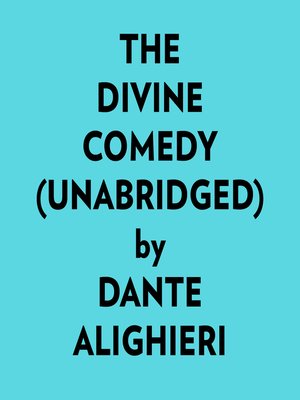
Sign up to save your library
With an OverDrive account, you can save your favorite libraries for at-a-glance information about availability. Find out more about OverDrive accounts.
Find this title in Libby, the library reading app by OverDrive.



Search for a digital library with this title
Title found at these libraries:
| Loading... |
Please note: This audiobook has been created using AI voice. Dante Alighieri's Divine Comedy is considered one of the greatest works in world literature, and it established the standardized Italian language that is used today. Writing between 1308 and 1320, Dante draws from countless subjects including Roman Catholic theology and philosophy, the struggle between the papacy and the Holy Roman Empire, Greek mythology, and geocentric cosmology to answer the ageold question: what does the afterlife look like? Dante's vision of the answer, this threevolume epic poem, describes in great detail the systematic levels in Hell, Purgatory, and Heaven. The poem opens with Dante's death—not his actual death that would come shortly after his work's completion, but his fictional death—where the author is found wandering in a dark forest. Blocked from climbing towards the bright light by a shewolf, a leopard, and a lion, he is forced to walk further into the darkened valley and towards the gates of Hell. Dante and his guides must then travel through the nine circles of Hell, seven terraces of Purgatory, and nine spheres of Heaven to experience divine justice for earthly sins so that he may reach the Empyrean and receive God's love. On his journey, he will learn that one must be consciously devoted to the path of morality and righteousness, else one find oneself on a path towards sin. This production is based on Henry Wadsworth Longfellow's blank verse translation. Longfellow succeeds in capturing the original brilliance of Dante's internal rhymes and hypnotic patterns while also retaining accuracy. It is said that the death of his young wife brought him closer to the melancholy spirit of Dante's writing, which itself was shaped by his wounding exile from his beloved Florence in 1302.






